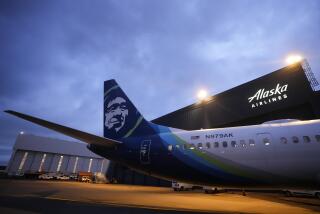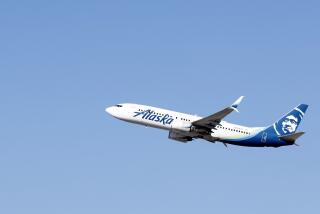Stricter DC-10 Brake Standards Urged
- Share via
WASHINGTON — The National Transportation Safety Board on Monday warned that McDonnell Douglas Corp.’s brake wear standards for its DC-10 planes are deficient and could lead to a disaster during an aborted takeoff.
In a letter advising the Federal Aviation Administration that the company should be required to set higher standards immediately, the board said it was concerned that many DC-10s might be operating with worn brakes that probably would fail if a takeoff had to be aborted.
It also suggested that other types of commercial aircraft may have inadequate standards for brakes.
Investigating Accident
The recommendations came as the board was investigating a May 21 accident in which the pilot of an American Airlines DC-10 speeding down a runway at Dallas-Ft. Worth Regional Airport tried to abort the takeoff because a warning light indicated the plane’s wings were configured improperly.
Eight of the jet’s 10 brakes failed within seconds, and the aircraft was still going faster than 100 m.p.h. when it crossed the end of the runway, the board said.
The aircraft, with 240 passengers aboard, traveled 1,000 feet farther and plowed to a stop. Eight people were injured in that incident.
Too Worn to Stop
The safety board said that even though American had serviced the brakes in accordance with McDonnell Douglas specifications--which allow 1,000 landings between brake overhauls--the brakes were too worn to stop the speeding aircraft.
“The safety board believes that worn brakes have too little mass to absorb or dissipate the heat built up” during an aborted takeoff, the board wrote Federal Aviation Administrator T. Allan McArtor.
The board advised the FAA to require McDonnell Douglas to set new, tougher standards and to put out immediately a directive to airlines to abide by them.
Telegrams Sent to Airlines
Elayne Bendel of McDonnell Douglas in California said that the company already has sent telegrams advising the airlines to be more conservative in brake maintenance, and that the company is reconsidering its maintenance standards for the DC-10 brakes.
A spokesman for United Airlines said that the Chicago-based carrier is reviewing the situation. “We’re evaluating the issue ourselves at our maintenance base in San Francisco and in Denver, where we train our pilots,” he said.
American Airlines spokesman Al Becker said the company is studying the safety board’s statement, but he said the carrier had already tightened brake maintenance standards for its 10 DC-10 Series-30 planes after an internal investigation prompted by the accident in May.
Even before that incident, Becker said, the airline’s brake wear standards were twice as high as what McDonnell Douglas was recommending. After the accident, brake standards were tightened even more, he said.
Lacks Rules
The safety board also said it was concerned that other aircraft manufacturers might have inadequate brake-wear standards for their planes, because the FAA has no rules for ascertaining whether worn brakes can stop a speeding aircraft.
It recommended that the FAA conduct brake-wear tests on other commercial aircraft to ensure that maintenance standards currently followed by the airlines are high enough.
The FAA said it agreed with the board’s conclusions and is in the process of developing new, minimum braking requirements for all jetliners and, perhaps, special directives for the DC-10.
More to Read
Inside the business of entertainment
The Wide Shot brings you news, analysis and insights on everything from streaming wars to production — and what it all means for the future.
You may occasionally receive promotional content from the Los Angeles Times.










